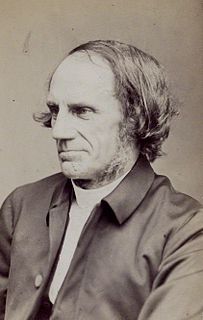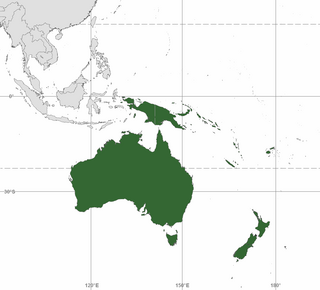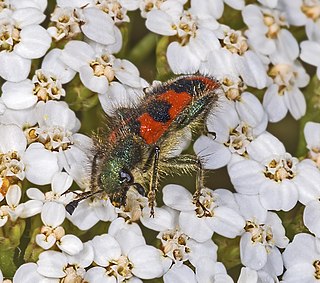
A language family is a group of languages related through descent from a common ancestral language or parental language, called the proto-language of that family. The term "family" reflects the tree model of language origination in historical linguistics, which makes use of a metaphor comparing languages to people in a biological family tree, or in a subsequent modification, to species in a phylogenetic tree of evolutionary taxonomy. Linguists therefore describe the daughter languages within a language family as being genetically related.

Christopher Wordsworth was an English bishop in the Anglican Church and man of letters.
PubMed is a free search engine accessing primarily the MEDLINE database of references and abstracts on life sciences and biomedical topics. The United States National Library of Medicine (NLM) at the National Institutes of Health maintain the database as part of the Entrez system of information retrieval.

Commonly, "cousin" refers to a "first cousin", a relative whose most recent common ancestor with the subject is a grandparent. More generally, in the lineal kinship system used in the English-speaking world, a cousin is a type of familial relationship in which two relatives are two or more familial generations away from their most recent common ancestor.

Supplex Libellus Valachorum Transsilvaniae is the name of two petitions sent by the leaders of the ethnic Romanians of Transylvania to the Holy Roman Emperor Leopold II, demanding equal political rights with the other ethnicities of Transylvania and a share of the Transylvanian Diet proportional to their population.
Baptism of desire is a teaching of the Anglican Communion, Lutheran Church and Roman Catholic Church explaining that those who desire baptism, but are not baptized with water through the Christian Sacrament because of death, nevertheless receive the fruits of Baptism at the moment of death if their grace of conversion included "divine and catholic faith", an internal act of perfect charity, and perfect contrition by which their soul was cleansed of all sin. Hence, the Catechism of the Catholic Church observes, "For catechumens [those instructed in the Catholic faith who are preparing to be baptized into the Catholic Church] who die before their Baptism, their explicit desire to receive it, together with repentance for their sins, and charity, assures them the salvation that they were not able to receive through the sacrament". Some traditional Catholics, including Most Holy Family Monastery, oppose the teaching or consider it a heresy because it contradicts strict interpretations of the Catholic dogma referred to as "extra Ecclesiam nulla salus."

A drinking song is a song sung while drinking alcohol. Most drinking songs are folk songs or commercium songs, and may be varied from person to person and region to region, in both the lyrics and in the music.
Walcher of Malvern was the second Prior of Great Malvern Priory in Worcestershire, England, and a noted astronomer, astrologer and mathematician. He has been described as an important transitional figure, whose observations and writings reflected the transformation of the astronomy of the Latin West from its traditional focus on computing dates in the ecclesiastical calendar and studying the rudiments of Roman astronomy to the use of ancient astronomical computational methods learned from Arabic zijes and other Islamic sources.

Alphonse or Alfons, Count de Berghes – Glymes was Archbishop of Mechelen, Belgium. He was appointed 7th Archbishop in 1670.
Francis Xavier Schmalzgrueber was a German Jesuit canonist.

The Perpetual Virginity of Blessed Mary is an apologetic work of Saint Jerome. It is an answer to Helvidius.

Australasia is a region which comprises Australia, New Zealand, and some neighbouring islands. The term is used in a number of different contexts including geopolitically, physiogeographically, and ecologically where the term covers several slightly different but related regions.
Thomas Bray D.D. was an Irish Roman Catholic prelate who served as the Archbishop of Cashel from 1792 to 1820. Dr Bray was ordained to the priesthood on 22 May 1774 at Paris.

Information technology (IT) is the use of computers to create, process, store, and exchange all kinds of electronic data and information. IT is typically used within the context of business operations as opposed to personal or entertainment technologies. IT is considered to be a subset of information and communications technology (ICT). An information technology system is generally an information system, a communications system, or, more specifically speaking, a computer system – including all hardware, software, and peripheral equipment – operated by a limited group of IT users.
William Cooke, widely known as Canon Cooke, was a Church of England clergyman, hymn-writer, and translator.

Clerinae is a subfamily of beetles in the family Cleridae.

Clerus is a genus of beetles in the subfamily Clerinae.
Arthur Broome was one of a group of creators of the Royal Society for the Prevention of Cruelty to Animals (RSPCA) in 1824. Broome was appointed as the original society's first Secretary, a post he held until 1828. He held posts at various churches in London, Essex, and Kent, and supported an appeal for earthquake relief in Syria. He wrote about animal theology and also about two 17th-century English clergy. He was guarantor for the RSPCA's debts, which led to his financial ruin and in April 1826 he was sent to a debtors' prison.

"In taberna quando sumus" is a medieval Latin Goliardic poem, part of the collection known as the Carmina Burana, written between the 12th and early 13th centuries. It was set to music in 1935/36 by German composer Carl Orff as part of his Carmina Burana which premiered at Frankfurt Opera on 8 June 1937. Within Orff's Carmina Burana, this drinking song is the 14th movement in section 2, In Taberna.
The Council of Toledo of 447 was the second Council of Toledo. It was a national council held against the Priscillianists, as called for by Pope Leo I. Nineteen bishops participated in the council, which condemned the heresy and the followers of Priscillian and affirmed the earlier First Council of Toledo, on which its Creed is based. It gave a profession of faith against all heretics with 18 anathemas attached against the doctrines of Priscillian. The council is notable for its successful subduing of Priscillianism, expressing a definition of dyophysitism before the Council of Chalcedon, its affirmation of the First Council of Toledo, and being the first known western council to include the "filioque" in its creed, following in the doctrine from Pope Leo I.












